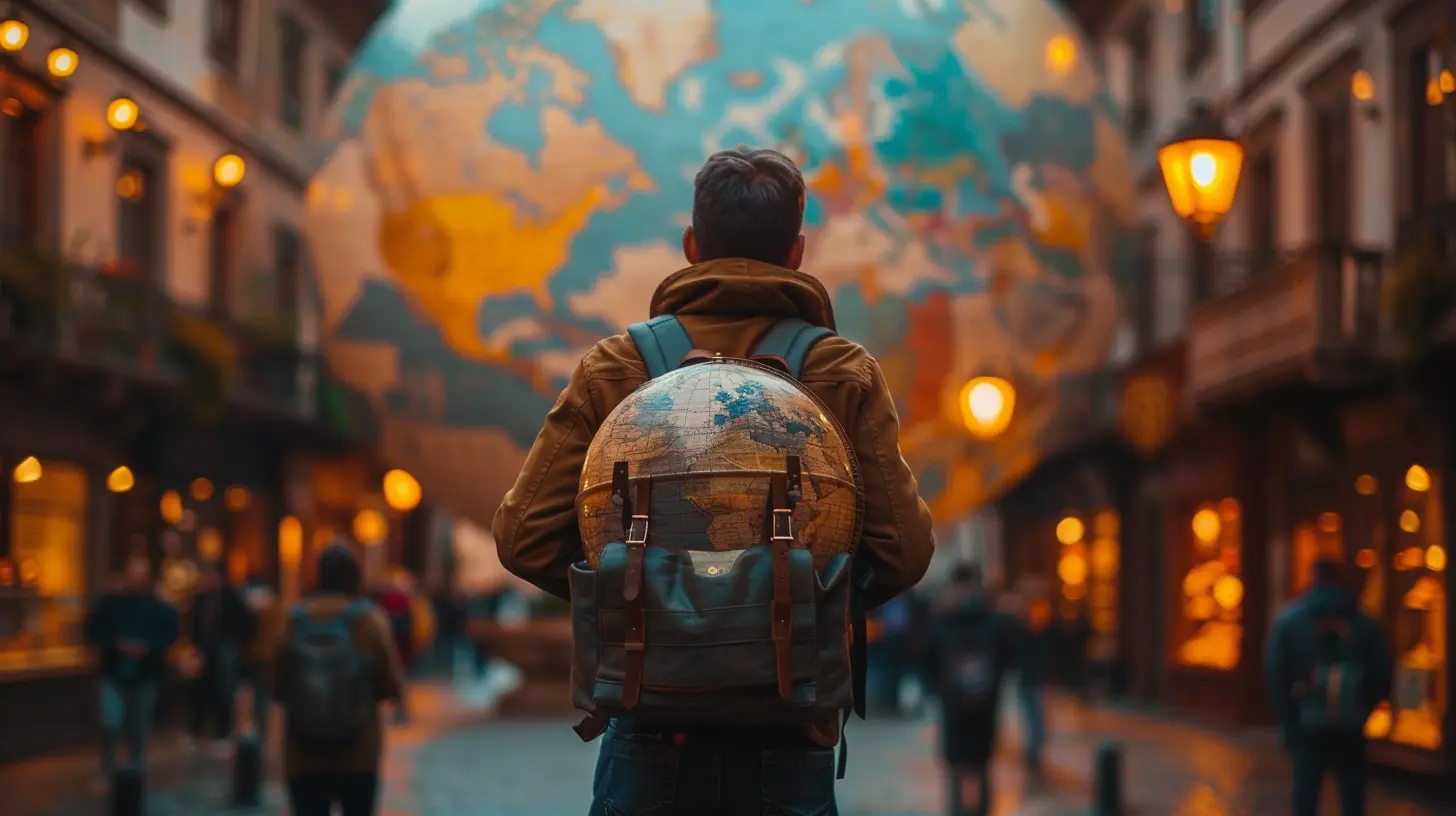Dealing with Cultural Differences: How to Stay Safe and Respectful
18 August 2025
Traveling the world is a beautiful way to open your mind, taste new flavors, make unforgettable memories, and meet people you’d never cross paths with otherwise. But, let’s be honest — it's not always smooth sailing. Ever found yourself in a new country doing something totally normal by your standards, only to be met with confused stares or awkward silence?
Yep, cultural differences can catch you off guard.
That’s why understanding and respecting local customs, behaviors, and traditions is more than just good manners — in many cases, it keeps you safe and saves you from major embarrassment (or legal trouble). In this article, we’ll dive deep into how to navigate cultural differences like a pro while keeping both your dignity and safety intact.
Why Cultural Awareness Matters When Traveling
Before we dive into tips and strategies, let’s talk about why this even matters.Culture shapes how people think, act, communicate, and even how they interpret basic human behavior. What’s polite in one country might be considered rude in another. For instance, making direct eye contact shows confidence in the US, but in some Asian countries, it can come across as confrontational or disrespectful.
When you’re in someone else’s home (or country), it’s only fair to adjust your behavior to fit their norms. After all, you wouldn’t walk into someone’s house with muddy shoes and plop down on their white couch, right?
Staying culturally aware shows you’re not just a tourist — you’re a respectful traveler. That attitude gets you better treatment, deeper connections, and a much safer and more enriching experience.
Step 1: Do Your Homework Before You Go
Let’s face it — ignorance isn’t a great travel companion. The easiest way to avoid cultural blunders is to dig into the basics before your flight even takes off.Research Local Customs and Taboos
A quick Google search can reveal a lot about a country’s do’s and don’ts. Look up:- Dress codes (especially for religious or conservative countries)
- Dining etiquette
- Public behavior norms
- Greeting customs
- Religious practices and holidays
- Laws (especially those concerning alcohol, drugs, photography, and public displays of affection)
It takes 30 minutes, but it could save you from an uncomfortable or even dangerous situation.
Learn a Few Local Phrases
Even if it’s just “hello,” “please,” and “thank you,” speaking a little of the local language goes a long way. It shows that you care enough to make the effort, and locals will appreciate it.Don’t worry — you don’t need to be fluent. Think of it as a social cheat code.
Step 2: Dress Accordingly
This one’s a biggie, especially when traveling to places with conservative values.Respect Local Dress Norms
Wearing shorts and a tank top might be totally normal at home, but it won’t fly in certain regions of the Middle East, parts of Asia, or even some religious sites in Europe.When in doubt, cover your shoulders and knees, avoid clothing with offensive graphics or slogans, and stay subtle. You can always observe what locals are wearing and follow their lead.
This isn’t about limiting your personal expression — it’s about blending in and staying respectful.
Step 3: Watch Your Body Language
Ever heard the saying, “actions speak louder than words?” Well, that’s even more true when you’re navigating cultural differences.Gestures Might Mean Something Different
A thumbs-up might mean “good job” to you, but in some countries, it’s equivalent to flipping the bird. Likewise, beckoning someone with your finger — common in the West — is seen as highly disrespectful in parts of Asia.Crossed legs, prolonged eye contact, pointing — all of these can carry unintended messages.
Your best bet? Keep your gestures neutral and observe how locals interact. Monkey see, monkey do — in the best possible way.
Step 4: Understand Religious Sensitivities
Religion is deeply woven into the cultural fabric of many countries, and you’ll want to tread carefully here.Be Respectful at Religious Sites
- Dress modestly (even if you’re not religious yourself)- Remove your shoes when required
- Keep chatter to a minimum
- No selfies unless it's clearly allowed
Also, avoid touching religious artifacts, symbols, or statues unless you’re sure it’s acceptable.
When it comes to religion, the golden rule is simple: observe more, do less — at least until you’re confident about the local customs.
Step 5: Learn the Art of Non-Verbal Communication
Sometimes, words can’t do the job, especially if there’s a language barrier. That’s where non-verbal communication steps in.Smile, Listen, Observe
A genuine smile is universal. Listening actively and observing how locals interact will help you adapt quickly. You’ll notice patterns in tone, posture, and even how people queue or interact in public.Pro-tip: If you’re unsure about something, mimic the locals politely. Most people are forgiving and appreciative when they see you’re trying.
Step 6: Stay Alert & Avoid Stereotyping
Let’s be real — no one likes being bunched into a stereotype. And while you might have preconceived ideas about a place or a group, resist the urge to assume or generalize.Keep an Open Mind
Cultures vary not only from country to country but within countries too! What’s considered normal in Tokyo might not fly in Osaka. Similarly, a rural village likely won’t have the same social norms as a major city.Ask questions. Be curious, not judgmental. It’s the difference between being a respectful traveler and an ignorant one.
Step 7: Stay Safe Without Being Paranoid
Respecting culture also has a lot to do with being aware of your surroundings and knowing how to protect yourself without offending locals.Blend In When Possible
Tourists are easy targets. Flashy jewelry, loud clothing, and camera gear make you stick out like a sore thumb — and not in a good way.Try to dress like a local, keep valuables tucked away, and be cautious about where and when you pull out your phone, money, or passport.
Also, be mindful of local scams that prey on unaware tourists. Respect yourself enough to stay informed.
Trust but Verify
Say yes to new experiences, but also trust your gut. If something feels off, it probably is. Whether it’s a too-good-to-be-true taxi fare or a pushy vendor offering “free” gifts, it’s okay to politely decline.You’re not being rude; you’re being smart.
Step 8: Ask, Don’t Assume
One of the best ways to understand and respect a new culture? Ask questions.Locals usually love when you show genuine interest in their traditions, food, language, and way of life. You’ll find that these conversations are often the most memorable parts of your trip.
A simple “Is it okay if I…” or “What’s the local custom for…” can prevent misunderstandings and shows humility.
Remember, curiosity is not offensive — but ignorance sometimes is.
Step 9: Adjust Your Expectations
Expectation is the root of all disappointment, right? Traveling isn’t always Instagram-perfect — and it’s definitely not supposed to mirror your comfort zone.Be Flexible
Don’t expect punctuality in a laid-back island community. Don’t look for burgers in rural India. And don’t be shocked when things don’t move at your usual pace.Adaptability is your best travel buddy. The sooner you let go of your home-country expectations, the more enjoyable your trip becomes.
Step 10: Apologize if You Mess Up
You’re human. Mistakes will happen. Maybe you entered a temple with your shoes on, or misused a hand gesture. The key here is humility.A Sincere Apology Goes a Long Way
People are generally more forgiving than we think — as long as they see that your intentions were good. A smile, a quick apology, or even a small bow (if common in that culture) can defuse most situations instantly.We all mess up — what matters is how quickly and respectfully we correct course.
Final Thoughts
Cultural differences can feel like walking through a minefield at first, but they’re also what make travel so fascinating and transformative. Each time you step outside your bubble, you grow — becoming not just a smarter traveler, but a better global citizen.So, pack your bags, bring along a healthy dose of curiosity, and remember: when in doubt, observe, ask, and be kind. That’s the secret sauce to staying safe and respectful anywhere in the world.
Happy travels, globetrotter
all images in this post were generated using AI tools
Category:
Travel SafetyAuthor:

Ian Powell
Discussion
rate this article
1 comments
Tobias McCollum
Embrace differences; respect is key to safe travel.
August 18, 2025 at 3:22 PM

Ian Powell
Absolutely! Embracing differences fosters mutual respect, which is essential for safe and enriching travel experiences.


